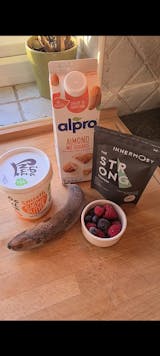As the new year is looming, people are starting to plan their new year’s resolutions. Whether that’s continuing to head to the gym or starting from scratch. People are looking for ways to boost and support their performance for the best results. The gym can be tough, we feel you, but there are many ways you can support your body with this new, or very familiar trip to the gym. You may have heard of creatine products, but if you’re still left wondering, what is creatine for? We’ve got you!
Creatine is a naturally occurring compound that people use to boost their athletic performance and to help build up their strength and muscles. It can be found in food supplements such as The Power Booster and is the go-to product for gym-goers and athletes as it’s perfect for high-intensity training. It’s increasing in popularity and quickly becoming one of the most popular sports supplements as everyone agrees… it works! But apart from the known results, does creatine have further benefits? Today we’re talking about all the creatine benefits beyond building muscle power that you may have not known about before.
Creatine for brain health
There have been studies that have shown, creatine not only has effects on your body, but it also has a positive effect on your brain health and helps to fight neurological diseases. Certain diseases that are neurological are caused by a reduction of the phosphocreatine in your brain. Phosphocreatine is found in your vertebrate and stores phosphates that provide energy for your muscular contraction. Increasing your phosphocreatine levels can maintain your daily function and reduce the level of cell death by 25%. Studies have shown that creatine has restored the level of phosphocreatine in mice that have Huntington’s disease. Making their brain’s levels of phosphocreatine 72% of the levels before the disease.
There have been other tests and research taken out on other animals that suggest creatine can improve other neurological diseases such as Alzheimer’s, epilepsy, and brain or spinal cord injuries. So, there’s no doubt that in animals creatine benefits the brain, and although more studies are needed in humans, it’s certainly food (supplements) for thought.
Further creatine brain benefits
Creatine can help to fight against neurological diseases but can also help to improve its function. Something a lot of people can struggle with is their memory, research has shown that in older people when they supplement creatine for 2 weeks they find that their memory significantly improved. It can also help to increase their brain function and reduce the loss of muscle and strength related to age.
Creatine is naturally found in meat, therefore vegetarians often have lower levels. A study shows that when vegetarians supplemented creatine, they found they had up to a 50% improvement in their memory.
Creatine against blood sugar levels and diabetes
Sugary treats are hard to avoid, especially when they are just so delicious. You may be happy to hear that research suggests that creatine can reduce your blood sugar levels. It helps to increase the functionality of your GLUT4 (glucose transporter type 4) which takes your blood sugar and distributes it into your muscles.
If your body has a short-term response to blood sugar after eating a meal, it can be a diabetes risk, so the faster your body clears the sugar from your blood the better. By boosting the distribution into your muscles by intaking creatine, you’re clearing your sugar from your blood quicker and reduces your risk of developing diabetes.
Reduce tiredness and fatigue
In a study that ran for 6 months on people with brain injuries, select patients were given creatine supplements and 50% of those supplemented found they had a reduction of dizziness. 80% of those patients given supplements found they didn’t experience any fatigue.
There were also studies on athletes that took a cycling test with creatine supplements didn’t get as tired. Creatine supplies your body with the energy needed daily as well as increasing your dopamine levels, making you less tired.
If you weren’t sure about trying out creatine, I’m sure these benefits will help you with your decision. Creatine is not only one of the cheaper options for food supplements, but it is also the safest out there. There have been over 200 years’ worth of research on this compound, with many studies that support the safety of long-term use of it. What are you waiting for, why not try it out?























